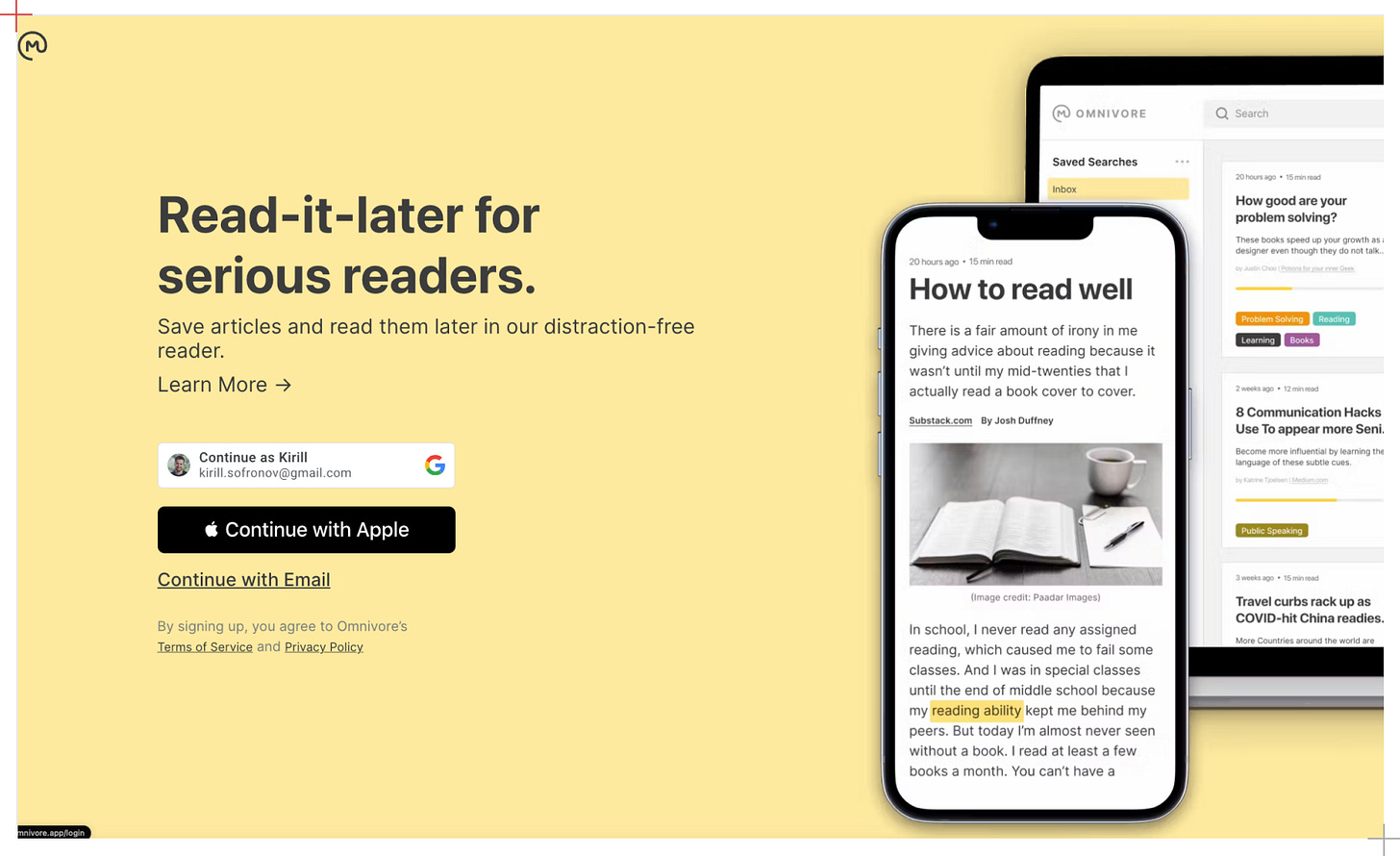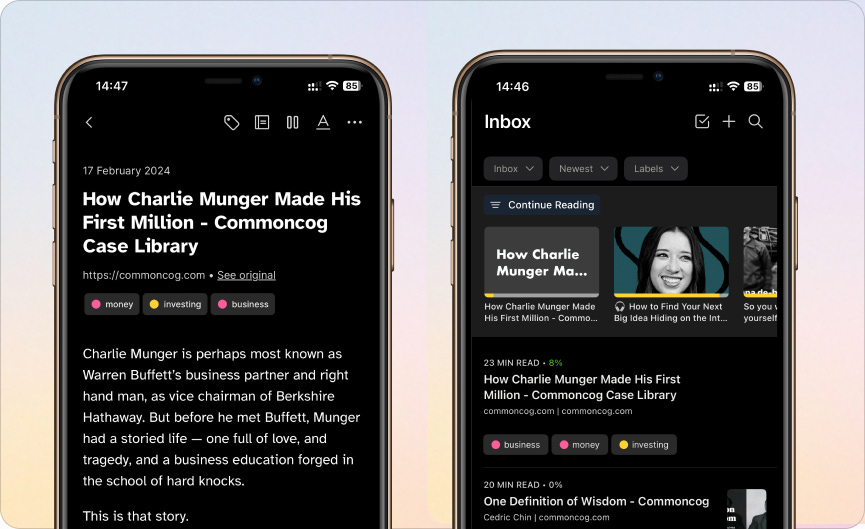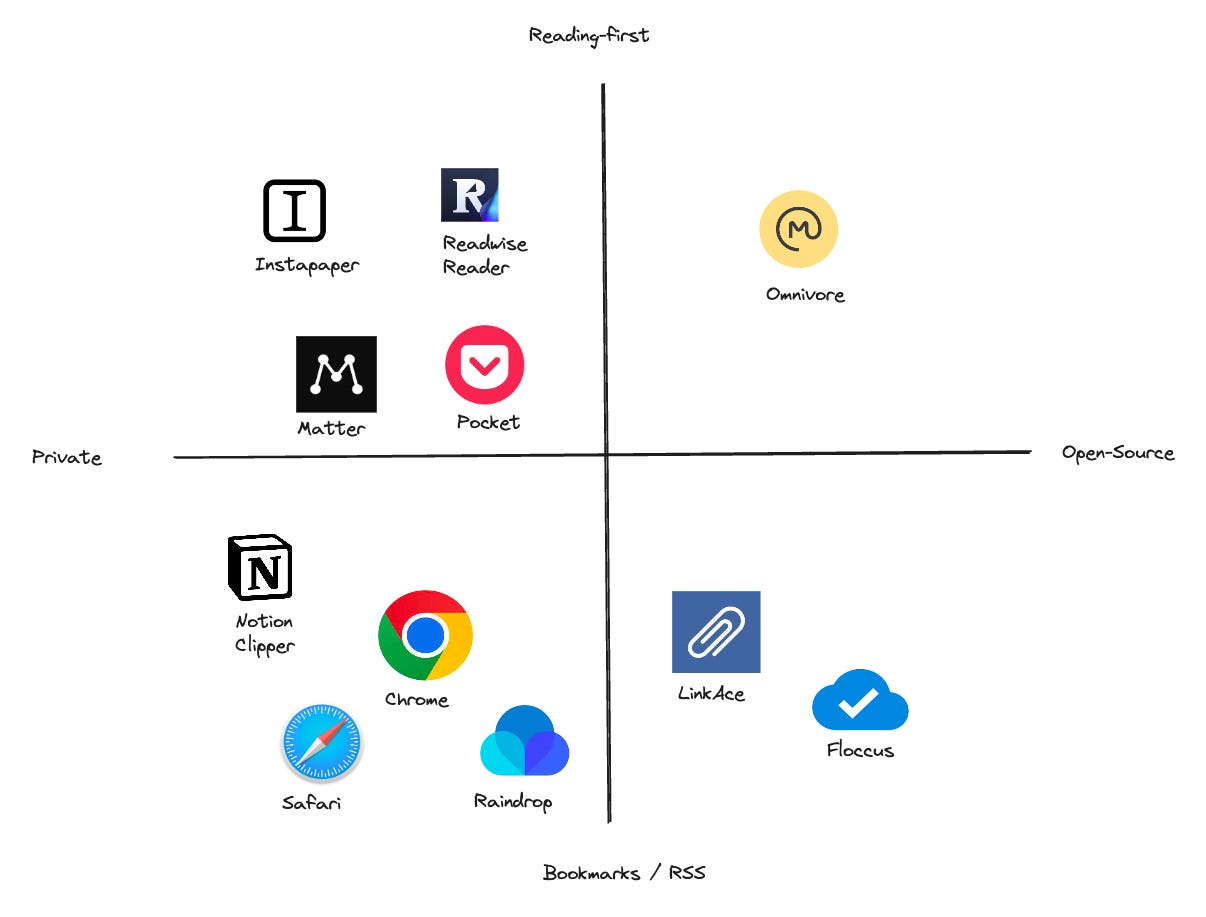Omnivore: The privacy-focused reader for knowledge workers
How to read more and filter through noise with privacy in-mind.
Update: As of April 2025, Omnivore has been acquired by ElevenLabs and is now working on ElevenReader. Omnivore app is no longer under active development.
TL;DR
Omnivore is a free and simple open-source read-it-later app with a focus on privacy.
Despite the crowded market, Omnivore stands out by offering an impeccable user experience, integrations, and content aggregation capabilities without compromising privacy.
The tool still lacks some of the sources such as YouTube, X.com, sharing capabilities, and more focus on delivering the “right content at the right time”, but it does the job well enough to be a good alternative to existing and legacy competitors.
Omnivore has an opportunity to leverage the new AI paradigm and become a centralized place to not only read but also get relevant and personalized content that has proven quality.
Today we are going to review a personal productivity tool in the space that has been popular since the early days of Web 1.0. In the ever-evolving world of digital products, it seems like this category just refuses to die and there is always room for improvement and new market entrants.
Bookmarking… or as it started and further developed into the read-it-later sub-category of products.
This tool has been personally my main consumption driver and I am proud to be categorized as a daily active user. I hope it will bring you as much utility as it has served me so far, a serial personal knowledge management enthusiast (e.g. procrastinator) and voracious consumer of newsletters, articles, and podcasts.
🔗 The problem statement
After using various bookmarking tools and the OG apps of the 2010s, I’ve been looking for something that can extract my highlights so I can work with them later and annotate. Hold and behold, there was a link on Reddit to Omnivore and it saved me not only from doing things manually but also cleaned up my inbox from hundreds of rows of content per week.
🔖 Omnivore’s story
Co-founder of Omnivore, Jackson Harper shared with us how Omnivore came to be:
“During covid, when we were all locked down, I identified reading as a habit I wanted to develop more. About a year prior I had gotten into running and it had really taught me the value of consistency when developing habits. I saw daily long form reading as a healthy habit that I wanted to have, and realized I just needed to start doing it every day.
I quickly realized it’s not that easy to focus on reading anymore. You have all these different channels pushing content to you, and most of it is pretty low quality. It’s optimised for clicks, but often doesn’t have much substance. USA politics were quite chaotic at the time, so that was getting constantly pushed to the top of my reading queue.
Omnivore came about from my desire to create a distraction free place, where the user is in control of what they want to read.”
🛠️ Top traits
At first glance, Omnivore doesn’t look very different from many other readers but it has something unique in store. Its user experience, clean interface and the bare essentials without the bloat. Let's go through some of the feature one by one:
Reading experience
User interface
The core of Omnivore is its dashboard with aggregated articles and side-bar with various filtering screens. At first sight, Omnivore doesn’t give you much. And in my view it's actually a feature. It focuses on your unfinished items, new content in the inbox and going down memory lane to highlighted sections that seemed to be of importance in the past.
Most of the time you’d be spending on the reading screen after it lands in your inbox. I like how simple the interface and the reading experience is:
Mobile app
The mobile experience is even more flawless. I believe it probably even beats desktop with an additional feature that is available on iOS — text-to-speech.
Instead of reading, listen to your articles like a podcast. No effort is needed, and it makes a brilliant companion during your commutes.
Aggregation
Capture clipper
My workflow these days is to capture everything on the web via Omnivore. If I find the article worth saving for later, I’d just use their Chrome extension to clip and watch during my morning commute.
Feeds
RSS is still here. Not everyone gets their newsletters into their inbox and many people are still subscribing to feeds. Omnivore includes support for fetching updates from such feeds and sending them to your inbox.
Email
Reducing my mail clutter and sending all newsletters in one place has been a tremendous relief.
Have you struggled with inbox 1000? I certainly did, and 99% of it wasn’t mail from people but my lack of discipline. Content unfortunately magnifies the mess.
Thanks to Omnivore, you can generate an email address and use it for newsletters. They’ll land directly into your inbox and can be further processed.
Workflows
Rules
Imagine this.
You save an article.
Add the label “summarise”
And when it's saved to Omnivore, you’ll get a TL;DR and automated annotations. Isn’t it awesome?
Sure you can do the same with ChatGPT by just pasting it, but I prefer to do everything from one place
Integrations
This was the biggest deal breaker for me. As a user of second-brain tools like Obsidian and Logseq, I save my highlights and sometimes articles to annotate and work with in the future. Copy-pasting doesn’t cut it and is a sure way to go crazy.
Omnivore automatically saves all your highlights and programmatically sends them to the tool of your choice. What’s best, it also taught me a cool way to declutter various digital spaces and gardens by having highlights on the same page under embedded paragraphs:
Omnivore serves as an aggregation and consumption layer before all the other steps:
Filters
We all get our inboxes full and have some context to look for. Omnivore offers simple labelling solutions similar to “tags”. There is also a way to save your search and pin them to come back to queries that are important or meaningful to you.
Open source
The main value prop of Omnivore is to own your data. Which is not important to everyone. However, consider that most of the tools we use these days may cease to exist, particularly if they don’t get to the scale that the stakeholders see as acceptable. When sun-setting happens, you lose not only access to your data but also a wrapper that can read and manipulate your texts, highlights and more.
Open source changes this. It allows for continuity, so even if the Omnivore team abandons the project, a group of other developers can keep working on it and you can host it yourself and keep using it as long as the code is available.
There are other benefits too. Transparency and the ability to audit the work being done are publicly available, providing more certainty in the future.
Another one is the collective intelligence of all people who can chip in with their work. External parties and individuals can contribute to the software at their own will, fix bugs, and improve features. For example, if I am lacking highlights from a specific place, I could create the integration myself and put a request to add it to Omnivore.
👥 Audience and landscape
So who is Omnivore for?
Because of its open-source nature, it becomes an “own your data” playing category. Some of the more OG services like Pocket offer recommendation features and fit into the private software part of the chart.
There are also competitors on the browser side such as reading lists and bookmarks. However, both Chrome & Safari are feature-poor and are not built for reading. The last category is open-source bookmark managers, but these seem like a worse version of the private ones at this point.
🪄 Magic Wand
More sources
I wish to export my book highlights and notes from the Kindle or Kobo ecosystem. It's not a deal breaker as I can still use other tools to save the highlights and annotations somewhere else, but it would fill the full experience. Adding other sources such as being able to consume a Youtube video and annotate would be amazing which was my main missing piece when I moved from Readwise Reader.
X.com (ex-Twitter) is currently also not supported because of a lot of changes to their policies.
Sharing with my friends
I love sending unsolicited “life advice” to my friends and family. Usually, that happens via links to an article directly, but from time to time I add a message. An ability to send an article with added highlights and annotations that other people can see and hence do multiplayer would be amazing.
Relevance conundrum
One issue with the modern world is the sheer number of information we get. At some point, I realised I shouldn’t send everything to Omnivore as it becomes a mess. Digital hoarding is a crime that should be punishable.
One thing that Omnivore can help with is to assign what is important, given they’d have the information about article popularity and potential truthiness.
Similar to Pocket recommendations, but perhaps with more data in the background.
💰 Biz
Omnivore is currently free, and the team accepts donations. They have communicated that in the future, none of the current features will be paywalled, although it begs the question, how will they monetize?
Based on SimilarWeb data, the website currently gets around 300k clicks. Assuming 5% actually registers and around 10% usage daily, I’d estimate around 2k DAU at this point.
Provided the above is true, most open-source software monetises with enabled hosting by default which is already the case, but let's assume some premium AI features are on a horizon. Omnivore could introduce a PRO version and become a freemium product for power users.
The concern is though that the core functionality is already sufficient and attracted many users particularly because of a generous free tier which could make subscription conversion rate be on the lower end.
📈 Strategy
Consumer SaaS is a notoriously hard business. Despite the productivity app market being evaluated at upwards of $5B a year, its catering towards power users in what is considered a crowded market. However, it doesn’t seem like a winner-takes-all market and plenty of tools can co-exist catering to sub-niches such as mainstream, developers, designers, bookmark-first tools etc.
Omnivore could acquire dozens of thousands of users with a simple strategy, being free and open-source with the feature parity of other readers and catering to those with privacy concerns.
Its current positioning and advantage is quick iteration cycles and incorporating user feedback as well as taking on refugee hermits from other tools like Pocket and Instapage.
The opportunity could be to not only provide the reader experience but enhance it to the next level as a trend setter. For example, I tend to discover good writing and articles via references, but given Omnivore knows which articles are being pinned, it can recommend personalised content.
Another direction can be utilising the latest AI development with LLMs and enable key point summaries if short in time as well as build more integrations with other tools which could help Omnivore with distribution.
Wrapping Up
Omnivore is not the most feature-rich tool out there, but it has a promising future. The team and community responded to discord and all my complaints (such as raising feed limit above 50) were heard and fixed within hours.
I am bullish on the future of open source and the recent trend of creating open source versions of our daily drivers to compete with existing incumbents.
Meanwhile, you can enjoy your content in a free and private manner.
Till next time…










